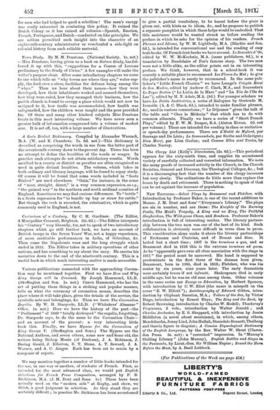We may mention together a number of little books intended
for the use, in one way or another, of students of French. First, as intended for the most advanced class, we would put English Selections for French Prose Composition, arranged by P. B. Dickinson, M.A. (J. M. Dent and Sons. ls.) These have been actually used on the "modern side" at Rugby, and show, we think, a good judgment in selection. As they stand they are certainly difficult ; in practice Mr. Dickinsonhas been•accustomed
to give a partial vocabulary, to be learnt before the pieOe is given out, with hints as to idiom, &c., and he proposes to publish a separate pamphlet in which these helps would be embodied. That this assistance would be wanted struck us before reading the preface in which he asks for the opinion of his readers. French Phrases and Idioms, by W. M. Lightbody, M.A. (Blackie and Son. 6d.), is intended for conversational use and the reading of easy text-books. Of French text-books we have several. Le Scarab& d' Or, edited by W. W. McKechnie, M.A. (same publishers, 8d.), is a translation by Baudelaire of Poe's famous story. The two men were not a little alike, as the editor points out in an interesting preface. We think, however, that in a school-book it was scarcely a suitable place to recommend Les Fleurs du Mal ; to give the publisher's name is surely to recommend. In the same pub- lisher's " Little French Classics " we have Lesage's Crispin Rival de Son Maitre, edited by Andrew C. Clark, M.A., and Souvestre'i Le Foyer Breton ("Le Lutin de in Mare" and "La Fee de rile du Lac"), edited by H. N. Adair, M.A. (8d.) For younger scholars we have La Petite Institutrice, a series of dialogues by Gertrude M. Ironside (A. & C. Black, 6d.), intended to make familiar phrases, &c., used in various connections ; " Le Dejenner " gives the talk of the table and " Chez le Medecin" that which has to do with common ailments. Finally we have a series of " Short French Plays," edited by F. W. M. Draper, B.A. (Alston Rivers. 6d. net per volume.) These are intended for reading in class or recitation or speech-day performances. There are L'Babit de Mylord, par Sauvage and De Leris ; Le Somnambule, par Scribe and Delavigne; Dieu Merci, par Leon Gozlan ; and Comma Elles sont Toutes, by Charles Narrey.










































 Previous page
Previous page